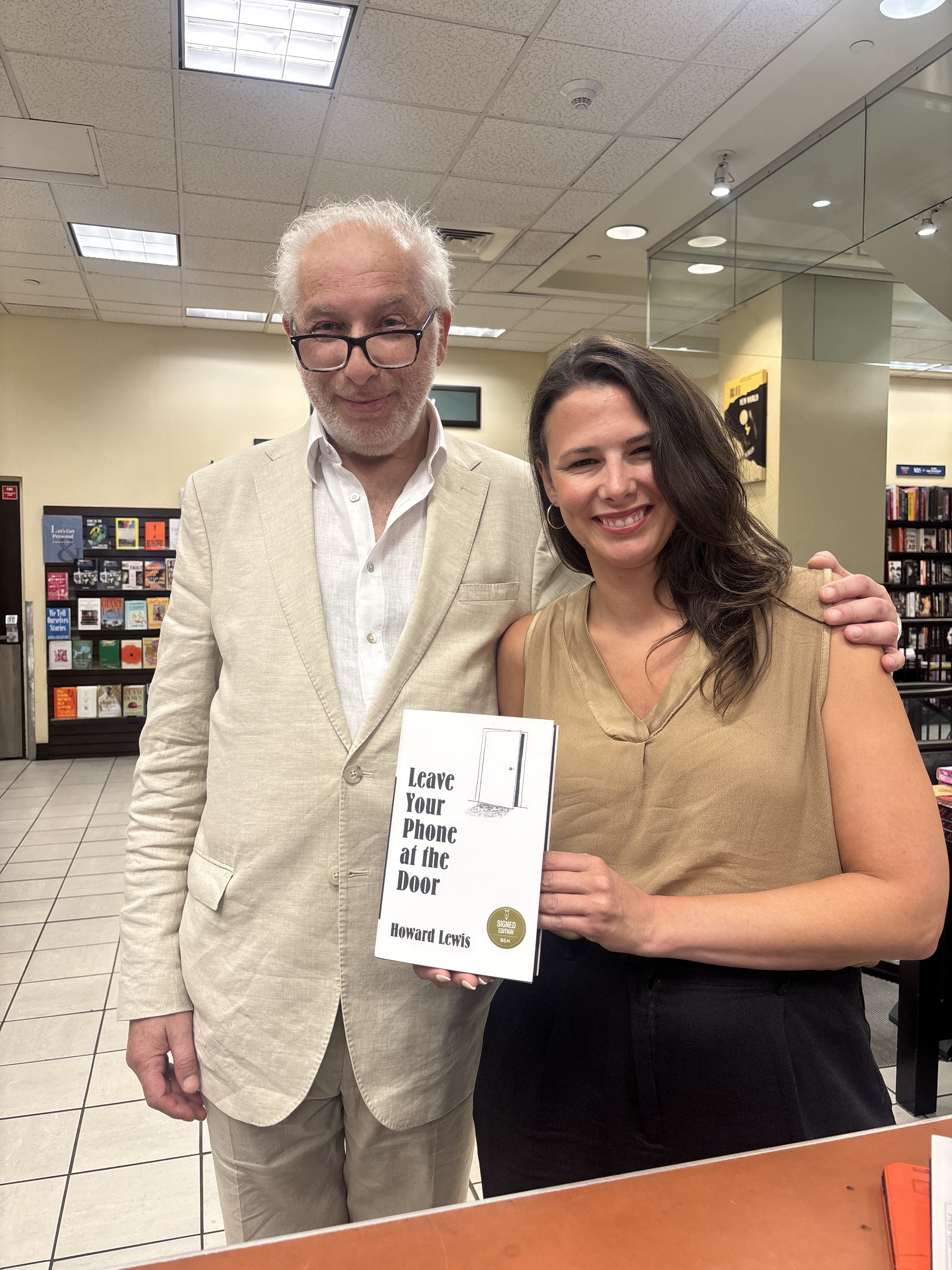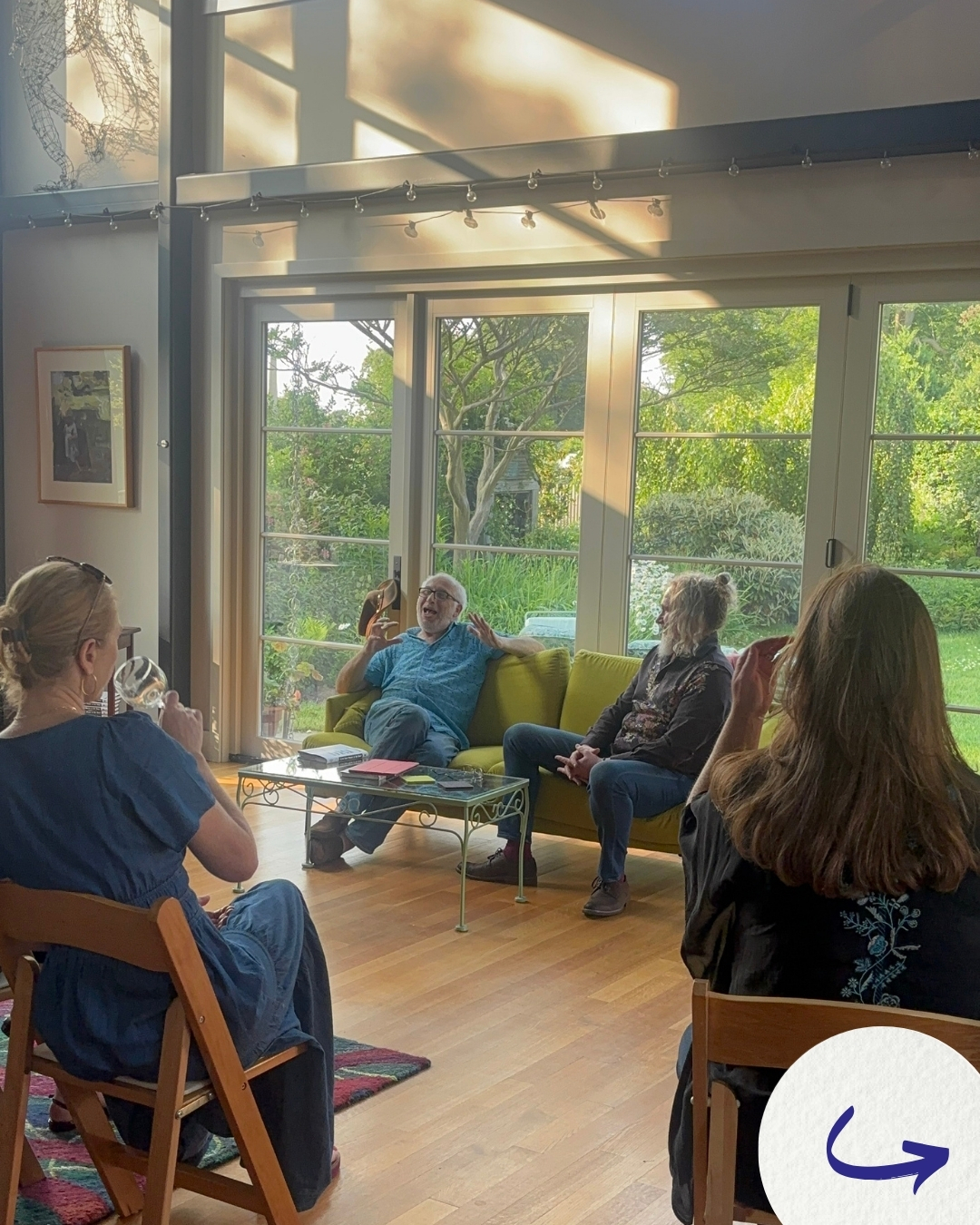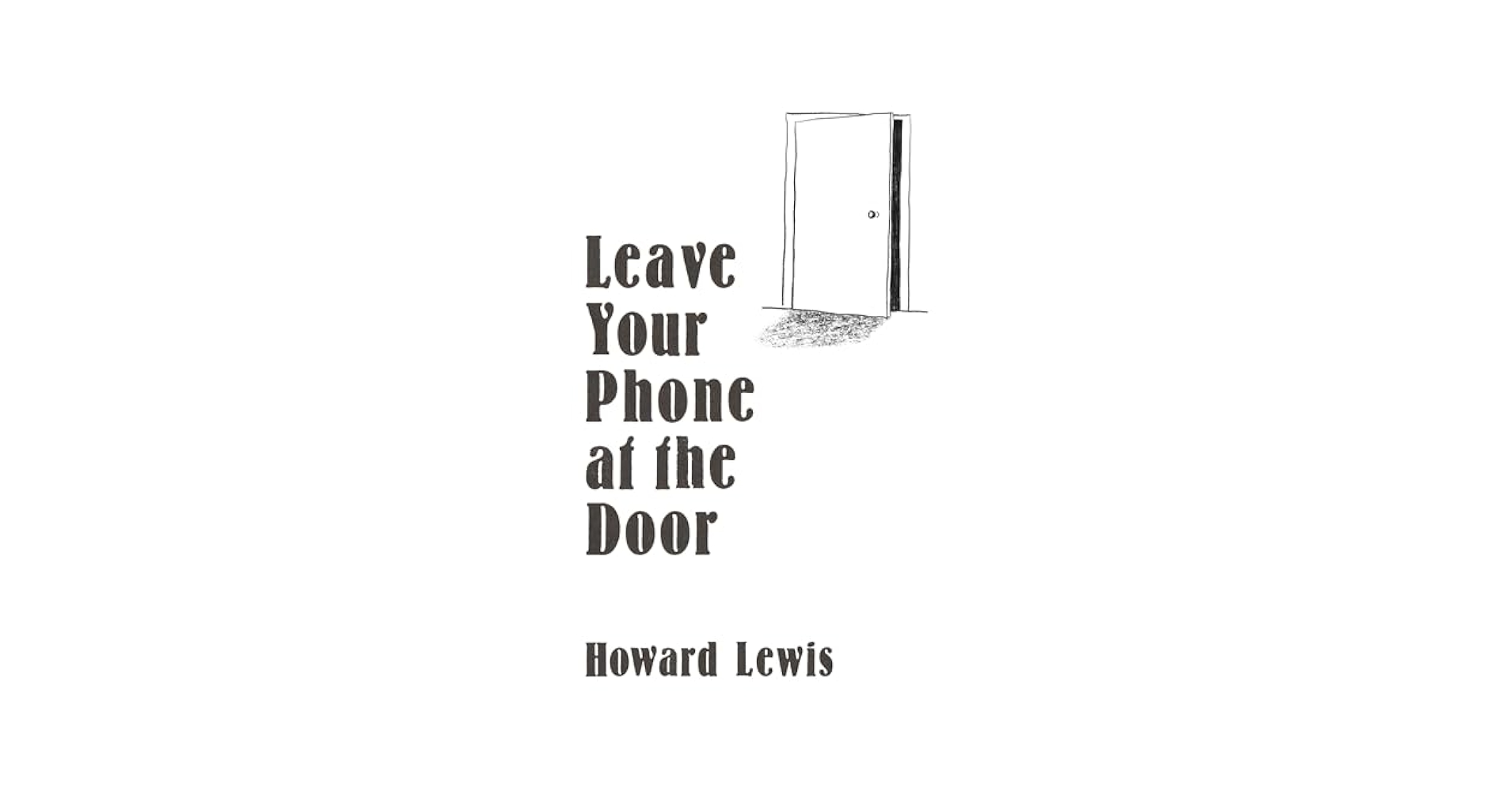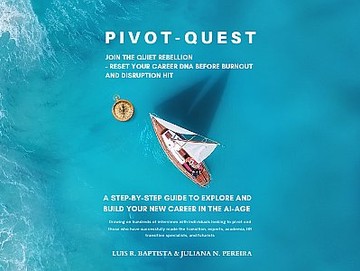by Sean Colligan
Howard Lewis, on the heels of his successful book campaign for Leave Your Phone at the Door, finally has a chance to put his feet up. He spent the summer virtually everywhere except for his home in London, including a book tour in the US with the Publishizer team and his ever growing community of readers.
In fact, if there’s one thing he is extremely adept at, it’s growing a community. On his most recent tour, as on nearly all his travels, he found himself effortlessly building fresh connections and relationships. Recalling a visit to Oklahoma City, for example, he ended up in conversation with the manager of the gift shop of the art museum after a meeting with the curatorial team.
“The manager of the store and I just got chatting. I always walk around with a copy of my book, wherever I go, as a sort of calling card. He noticed it and was intrigued. He flicked through it and loved the OFFLINE concept. Not only did he buy a copy himself, he ordered a dozen more for the museum shop which I understand have steadily sold. It is a recurring theme, whereby people would just say to me, ‘hang on, that's great, can we have some more?’ This kind of thing happens to me quite often. If you display both an open mind and a generosity of spirit, each pillars of the OFFLINE ethos, you will typically be rewarded on the upside.

But being in such demand also means a full schedule so, while he may not have extensive travel plans in the immediate future, he’s still receptive to opportunities beyond his book and dividing his attention between time zones. Most recently, he’s been collaborating with a film director in Canada, another one of his countless serendipitous connections, as an advisor. “It’s a film about art forgery. It’s a very interesting subject, and it’s something I know a little bit about, due to my background in the art world.”
Long before writing an acclaimed book and starting his OFFLINE project, which principally hosts face to face gatherings in London, one of his gateways into the professional world was art. At a young age, he became involved with the management of his family’s art collection. “About half the collection is on long term loan to museums and institutions in the UK, Ireland, America and many places besides. We’ve got far too much, frankly, to hang on our own walls so it is both a blessing and a privilege that we get to share it with so many people.”
Lewis’ proclivity for sharing would endure throughout his career and in all his relationships, professional and otherwise. “I think the notion of sharing your good fortune, whether you classify that as sharing works of art, sharing friends or connections or opportunities, has always resonated with me.” This would prove to be the cornerstone for his OFFLINE events, which crystallised the core concept that he wrote about in Leave Your Phone at the Door.
He admits that, long before his involvement in the art world, his personal passion was books. “We have books within the family collection in numerous categories, but I have helped develop book collections which are especially interesting to me. One particular example is a selection of early children’s books dating from the late 18th to mid 19th century comprising educational material, toys and games. These items were loved and appreciated and passed down through the generations. It is a sharp contrast to our throwaway society today whereby objects are routinely discarded in favour of the latest version but I have a leaning towards things which are utilitarian, practical and have enduring value. I’m just really curious.”
Curiosity is another part of Lewis’ personality that has always motivated him to connect with people from all over the world. However, he’s become increasingly concerned about the fact that curiosity isn’t as common in our social interactions as it used to be. Instead, he feels a greater force has driven people away from the desire to interact. “I believe that one of the single biggest factors is fear.” He continues with an observation that has become one of his most frequently quoted: “People are far more concerned with what may go wrong than what may go right.”
He gives a simple example with one of the most basic social interactions: greeting people on the street in the morning. “’Hello’, a wave, ‘good morning’, whatever. Nothing very complicated about it. But somehow there’s a fear that if you do that, something may go wrong. It may be misinterpreted, or someone may get angry with you, or think you’re a bit stupid.” But Lewis takes on the challenge himself, he has no problem laughing off the worry. “Perhaps they are right. Perhaps I am a bit stupid! Doesn’t much matter!”
In creating and hosting his OFFLINE events, Lewis has had the joy of meeting and introducing countless disparate individuals from around the world. Attendees are drawn from a myriad of cultural and social backgrounds. Yet despite all their superficial differences, Lewis consistently noticed a common theme each time he hosted an OFFLINE dinner.
“Most people agree to agree on most things,” he says. “One of the points I try to emphasise with OFFLINE is actually that there are far more points of convergence than divergence.” While the distinctions between guests might make them seem incompatible on paper or on a social media profile, they have often formed unlikely friendships and even professional partnerships that may never have happened otherwise.
In a world seemingly always online, it has never been easier to interact with people entirely through screens without ever needing to meet anyone in person or even stepping out of one’s home. But Lewis argues that social media has had a questionable effect on the way people socialise, or perhaps don't socialise.
“Everything has been benchmarked. Everything is on a list, everything is scrutinised, everything is compared endlessly.” Lewis posits that this not only affects online interactions, but even how people approach social situations in real life. “When you’ve got this backdrop of scrutiny, the sense that you’re being watched or measured or given a ‘score’, for many people it creates a sense of ‘better not’. ‘Better I don’t say anything, don’t stand out, don’t potentially embarrass myself.’ I feel that’s become a very dominant theme in modern society.”
But Lewis doesn’t believe technology to be all bad. “It’s actually very good,” he says “ but the problem, unfortunately, is people’s reliance upon it, or [the sense that] it is somehow superior to all that has gone before. And in my view, it’s not.”
As to “what has gone before,” Lewis talks further about the importance of in person human interaction from a historic and evolutionary perspective. “If you go back thousands of years, what was really clear was that your only way of prospering was through the ability to directly communicate, either about the weather or the danger of wild animals in the vicinity or engaging with another tribe, visually and verbally. You will find that the greatest achievements were typically galvanised via personal interaction.”

While Lewis recognises the benefits of our technology, he still maintains that it simply can’t fully replicate the benefits of face to face communication. “Technology diminishes physical engagement and connection, which is really part of our DNA and has been for millions of years. And I think finding a way to somehow recover that, in a very small way, is what OFFLINE has sought to achieve.”
Lewis insists that he wasn’t trying to solve any great mystery or some extraordinary issue, but just provide an opportunity for people to let their guard down and leave their smartphones behind for an enjoyable gathering. “I merely wanted to invite a bunch of interesting people, whatever their stripe, to a lovely venue and share a few stories over dinner. Not too long, not too late, not too expensive. Just enough whereby you can attract a very broad cross-section of people. And I feel like I did that.”
His book chronicles his creation of the OFFLINE project but also delves into the finer points of socialising, or what he dubs ‘codes of conduct’. “It’s all about the boundaries of acceptability, cultural taboos, kindness, civics, a bunch of stuff,” and incorporates stories from his travels abroad, especially Mexico City and Marrakech. “Within all these things, the fundamentals don’t change a great deal. You must accept that there’s an element of jeopardy to everything. Whether the plane is on time, whether you actually find and get to the right destination, whether your travelling companions are good company, a million different things. But all the while, those concerns are governed by my belief that there’s actually far more that connects people than separates them.”
His confidence in this approach to unknown social situations led to some unforgettable experiences during his book campaign. Since finishing his book, he’s appeared on roughly 25 different podcasts while the OFFLINE philosophy has featured in Forbes, Fast Company, and Japanese international news outlet Nikkei. It reinforces, as he says, “that the message behind the book is pretty universal. In fact, it gets more relevant with every passing day.”
But of all the podcast interviews he gave, one he remembers very fondly, and would recommend listening to as much as any other, wasn’t on an international platform or viral influencer show. Indeed, one of his favourite interviews was on “Thank God for Monday”, a career focused podcast produced out of the Catholic Seton Hall University in South Orange, New Jersey.
“The host had originally been a pharmaceutical executive who found God, and he loved everything about OFFLINE. He was enthusiastic, he listened carefully, he asked great questions. I liked that one because it was somehow so different from the others. It wasn't a conventional interviewer, it wasn't my traditional audience. It demonstrated once again that there is no one audience. There is no one way of expressing this idea. I just like a little variety, a little unpredictability, a little sense of the unknown, for them as much as for me."
With much of his professional life centred on networking and making friends, he has no want for contacts in traditional publishing. Some might be surprised that he did not utilise his connections to go directly to a major publisher, but he had his own reasons.
“You can go the traditional route, but it’s a slog. And you have to hope that you catch someone on the right day or when they’re in the right mood.” Instead, Lewis chose to follow a friend’s recommendation to work with Publishizer. “He said the process for him was great because of the template they provided, the level of after care, and the interest they showed in their authors. And I felt that I would have plenty of scope to impose my own voice without being constrained.” Even though Publishizer facilitated the publication of Lewis’ book through a major publisher, “I felt that I had much more control over the creative process. I also knew that Publishizer was a community in its own right and I liked the fact that there was a collaborative tone.”
OFFLINE events still garner attention in all directions and he has been approached to host them in various cities around the globe. His book has continued that trend without skipping a beat so, whatever may be on his horizon, even more diverse connections are sure to follow and, of course, he is always happy to share and reciprocate. After all, at its core OFFLINE is a celebration of the virtues of randomness and serendipity!


